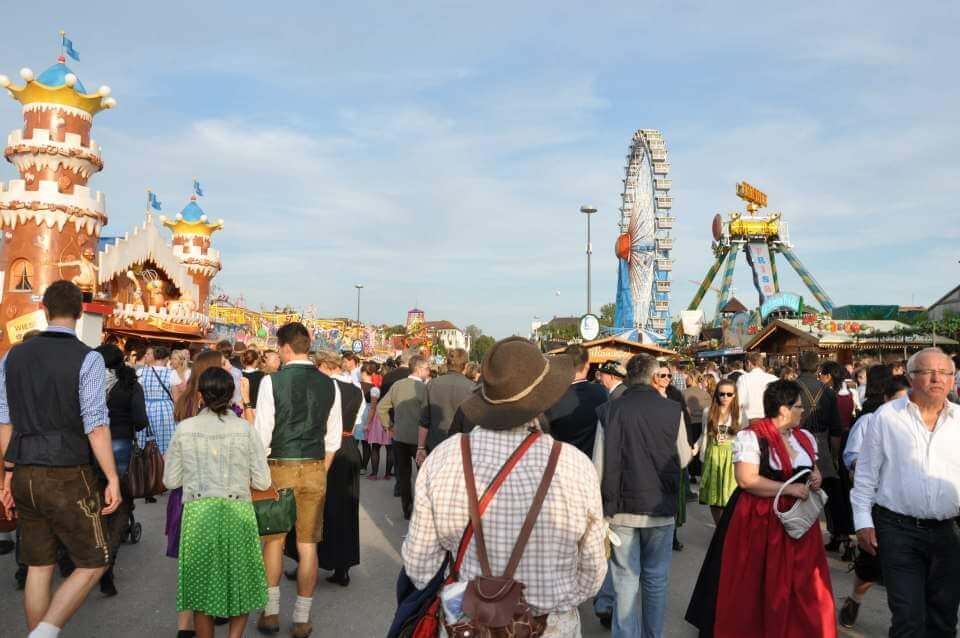Best Beer Festivals of Munich in 2024
While Leuvenin in Belgium has earned the nickname of being the beer capital of the world, Munich in Bavaria has earned its crown of being the beer festival capital of the world. You probably know that the world’s largest beer festival, Oktoberfest, is held annually in Munich. But only a few people outside of Bavaria know about other beer festivals celebrated yearly in Munich that are as fun as the famous Oktoberfest.
If, for some reason, you never heard about Oktoberfest or didn’t know that it’s held in Munich, let me introduce you to this beer festival that made Munich so famous.
Munich’s Most Famous Beer Festival: Oktoberfest
The history of Oktoberfest started in the 18th century when Crown Prince Ludwig I of Bavaria decided to celebrate his wedding with the entire Bavaria and the citizens of Munich. He ordered the Breweries of Munich and brewmasters to develop special brews for that occasion. This unusual royal wedding celebration eventually became the world’s largest beer and folk festival.
Oktoberfest or Wiesn as locals like to call it, is celebrated annually running for 17-18 days from mid- or late-September to the first Sunday in October. This year it will be celebrated from September 21 until October 6.
The first Sunday of Oktoberfest is traditionally celebrated by the Trachten and Schutzenzug. It is a carnival of traditional Bavarian costumes, brewery carriages, music, and dances. The participants move along a seven-kilometer-long route cheered by locals and visitors. If you are lucky, you will see the major of Munich in his carriage waving to the crowd.
Interesting Facts About Oktoberfest
- Number of annual visitors – over 6 million.
- Amount of beer consumed during the festival – 7.7 million liters or 2,000,000 US gal (in 2014).
- Oktoberfest is celebrated in 17 large tents, 21 small tents, and various rollercoasters and amusement facilities.
- Beer at Oktoberfest is traditionally served in 1-liter glasses containing a minimum of 6% alcohol. So be prepared for a hangover and quick visits to the bathroom.
Oktoberfest Survival Guide
If you don’t want to get drunk quickly or can’t drink pure beer in such large quantities you can order Radler or Russn (half-beer half-soda mix). Also don’t forget to eat a lot while you drink. My favorite food is traditional Oktoberfest chicken(Wiesnhendl) and Brezel.
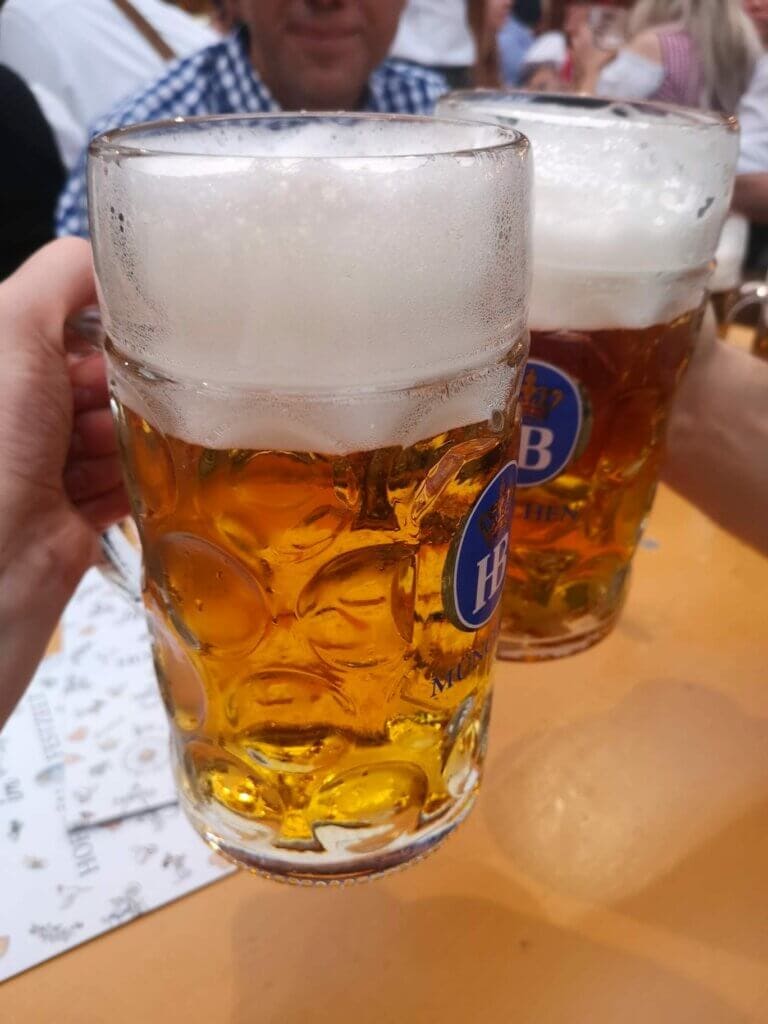
What to Wear on Oktoberfest
Traditional outfits are very common on Oktoberfest and all the other beer festivals in Munich. These traditional Bavarian costumes are called Tracht (Tra-oct). Women wear traditional dirndl (DEERN-dul) dresses while men wear lederhosen (leather shorts).
Dirndl usually consists of a bodice, blouse, full skirt, and apron. The style and length of the dirndl can vary, but during Oktoberfest, you’ll often see women wearing vibrant and colorful dirndls, accompanied by nice jewelry, flowers in their hair, or a hat.
Lederhosen are traditional Bavarian leather shorts typically worn by men. They are often accompanied by suspenders, a shirt, and sometimes a vest or jacket. Lederhosen come in various styles and lengths, but for Oktoberfest, knee-length shorts are common. They are usually made of high-quality leather and may feature intricate embroidery or embellishments. Lederhosen are usually accompanied by “trachten” shoes, the Bavarian hat (also known as a “Tirolerhut”) along with traditional socks called “Trachtensocken.”
Good quality traditional costumes can cost up to several hundred euros. If you add all the required accessories, it will eat up your budget. The good news is that you don’t need to buy them if you are planning to go to Oktoberfest once or twice. You can rent your favorite dirndl or lederhose for a fraction of the buying cost. Bavarian Outfitters offers costume rentals directly in the heart of Munich.
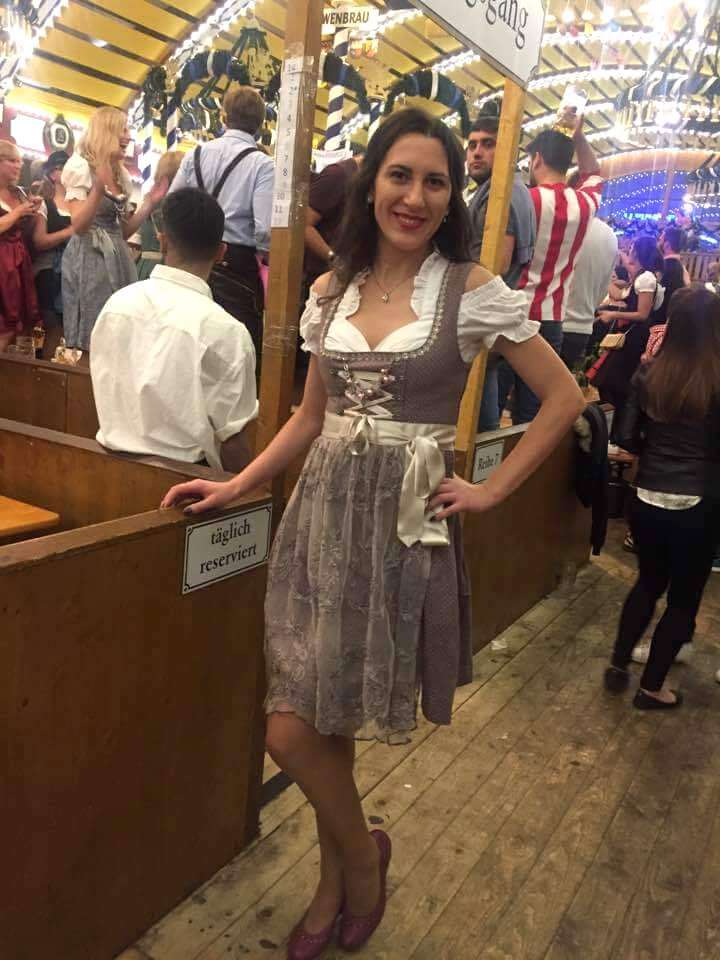
Munich’s Strong Beer Festival: Starkbierfest
Strong Beer Festival or Starkbierfest as locals like to call it, is one of the major beer festivals in Munich held in February-March. The period when Starkbiefest is held is considered to be Munich’s “fifth season” or “strong beer season”. Traditionally, during this time of the year, local monks brewed strong beer to ease their Lent time. At that time monks were obliged to follow strict fasting rules (no meat or animal products) so they came up with a trick to ease their lives during fasting. They started brewing a very strong beer rich in calories and even convinced the Pope that it didn’t break any fasting rules. To which the Pope said: “If they insist on drinking this swill, then so be it – for penance it’s suitable!”
The alcohol content in the strong beer is around 7-8% most famous brand being the Salvator from Paulaner Brewery. Three main beer halls host the largest strong beer fest celebrations:
- Paulaner am Nockherberg
- Löwenbräu Keller
- Augustiner Keller
Munich’s Spring Beer Festival: Frühlingsfest
If you missed the Oktoberfest or are too scared and overwhelmed by the huge crowds of Oktoberfest, I have good news for you. A much smaller and less crowded version of Oktoberfest is held in Munich in spring at the same location as Oktoberfest in Theresienwiese. Locals often call the Spring Beer Festival or Frühligfest the “Little Wiesn”.
Originally the Frühligfest was organized by showmen and showwomen in the 1960s as an additional source of income after the winter months. Today, it is a yearly beer celebration between April and May with some flea markets and traditional Bavarian music. Munich’s Spring Beer Festival is celebrated in two beer tens: Bayernland (by Augustiner Brewery) and Hippodrome (by Spaten Brewery).
Frühlingsfest Dates in 2024
This year The Frühlingsfest Munich (spring fair) will take place from 19 April to 05 May.
Kocherlball in Munich: More than Just a Beer Fest
Kocherlball is not a mere beer festival in the traditional sense. It is Munich’s largest folk dance event accompanied by large consumption of beer, traditional costumes, and Bavarian music. It is held every year in July in the heart of Munich’s English park at the Chinesicher Turm beer garden.
An interesting fact about Kocherball is that it used to be a get-together place for local servants in the 19th century. Even the name “Kocherl” means “cook” in the local dialect. Several thousand cooks and other servants got together early in the morning while their masters were still sleeping to dance and have a good time until it was banned by authorities in 1904. Luckily the event was revived later by the cultural department of the city.
Kochrlball takes place every year always on the third Sunday in July from 6 am to 10 am. Be there early or you’ll miss all the fun!
The 6 Breweries Serving Munich Beer Festivals
There are some important rules and traditional laws associated with beer festivals in Munich. One of them is that it is only allowed to serve beer from local Munich Breweries. This is especially true for the Wiesn (Oktoberfest). Another important rule is that all beer brands should be brewed according to the “Bavarian Beer Purity Law” also known as Renheitsgebot. This means it is only allowed to use traditional ingredients to brew beer, such as barley, water, and hops. Currently, there are 6 local Munich breweries serving beer during beer festivals in Munich and Bavaria. Most local beers are available in the supermarkets of Munich, and some beer brands such as Hofbräu and Paulaner are also exported abroad.
Augustiner-Bräu
Augustiner-Bräu or simply Augustiner is the oldest brewery in Munich established in 1328. It was founded by monks of Augistiner Monastery which was the largest sacred building in Munich at that time. The Augustinian monks supplied beer to Bavarian royalty until the 19th century when the monastery has been dissolved. Shortly after that the Augustiner Brewery was privatized and moved its headquarters to Landsberher Strasse. An interesting fact about the brewery is that it is the only one still using the traditional 200-liter wooden barrels, the so-called Hirschen, for storage.
Today Augustiner-Bräu operates a beer tent at the Oktoberfest and owns one of Munich’s largest beer gardens, the Augustiner-Keller at Arnulfstraße.
Hacker-Pschorr
Hacker-Pschorr was formed out of the merger of two separate breweries as you have probably already guessed. The history of brewery dates back to the 15th century. Today Hacker-Pschorr produces 13 different products some of which can be found in the United States. Hacker-Pschorr Brewery serves various tents at the Oktoberfest such as Hacker-Festzelt and Pschorr Bräurosl.
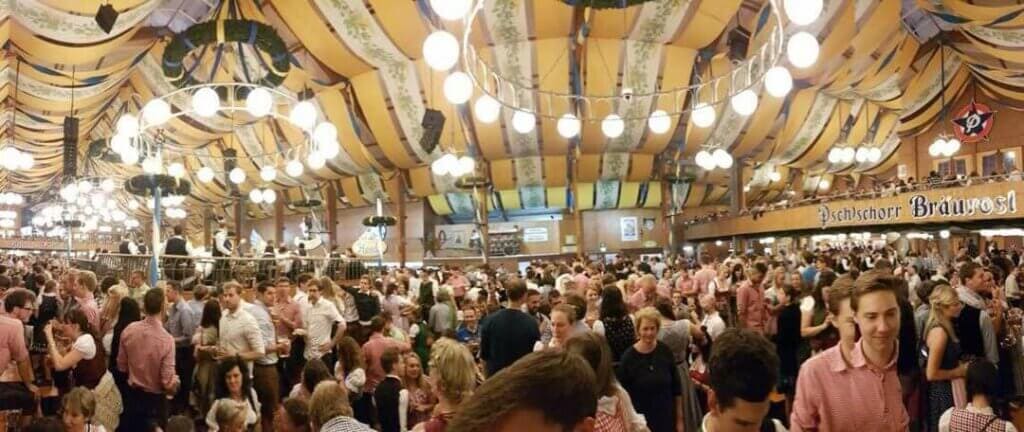
Hofbräu
Hofbräu Brewery in Munich is owned by the Bavarian state government. It was founded in the 16th century as the brewery of the old Royal Residence which was located right next to it. It was traditionally brewed in Hofbäruhaus am Platztl, one of the oldest beer halls in Munich and a major tourist attraction that should be part of your Munich itinerary. Later due to a lack of space, Howbräu Brewery moved to Hofbräukeller on Wiener Strasse while still operating its Hofbräuhaus beer hall. Today Howbräu beer is famous worldwide and operates chains in various locations. You can probably recognize its “HB” logo.
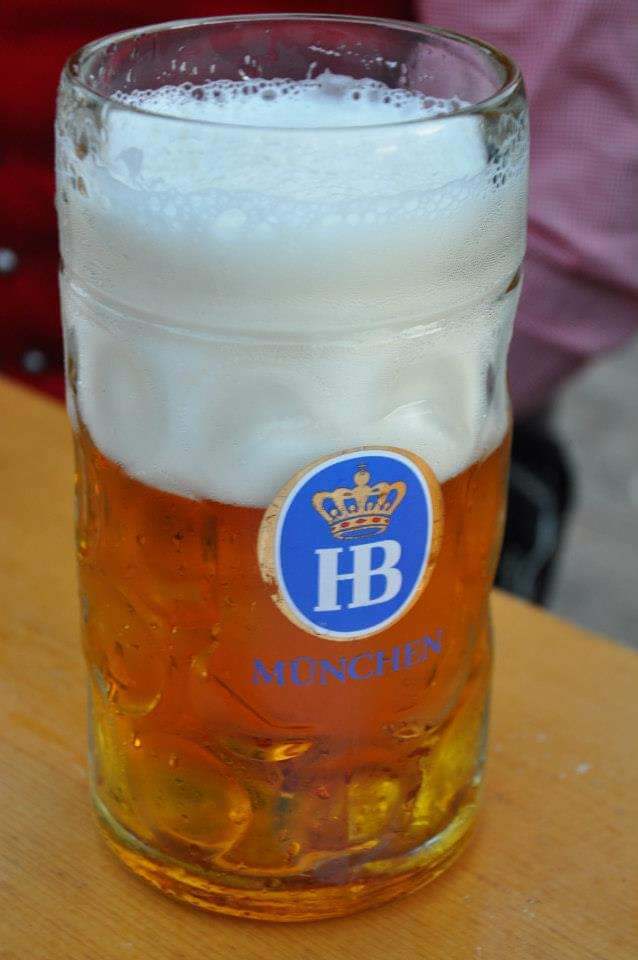
Löwenbräu
Löwenbäru called “Lion’s Brew” in German with its famous lion emblem, was founded in the 14th century. Today it is one of the largest breweries in Germany. You will recognize it on Oktoberfest thanks to a huge lion statue standing in front of the Löwenbräu beer tent.
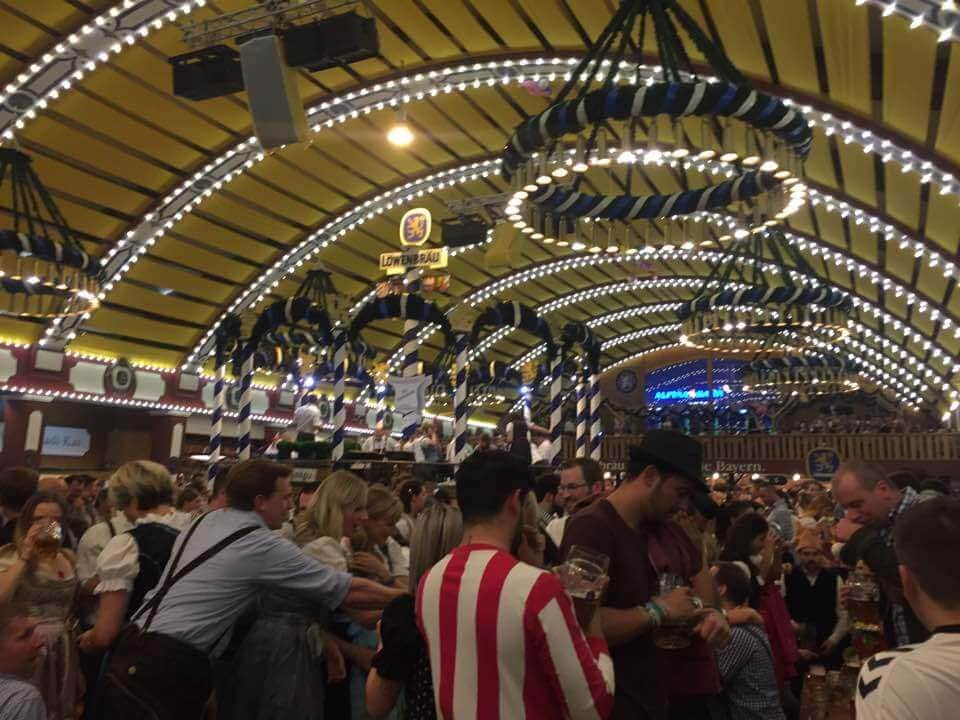
Paulaner
Paulaner beer ranks as one of the best-selling beers in Germany. The brewery was founded in the 17th century by monks of the Paulaner Order, making Paulaner the youngest Brewery in Munich. Paulaner beer is well popular outside of Germany’s border. More than 2 million hectolitres leave Paulaner Brewery each year – traveling from Munich to over 70 countries.
Spatenbräu
Spatenbräu or simply Spaten is another traditional Munich brewery dating back to the 14th century. In 1984 Spaten was the first brewery to brew the famous Münchner Hell (Munich Pale) or simply Helles and bring it to the market.
Related Articles
Munich’s Fairytale Castles
Most Beautiful Cities Around Munich
Munich vs Berlin: Which One to Visit
Living in Munich as an Expat
Disclosure: This article may contain affiliate links. If you purchase something through them, I may earn a small commission at no cost to you. It’s a win-win for both of us and helps to keep this content free.

